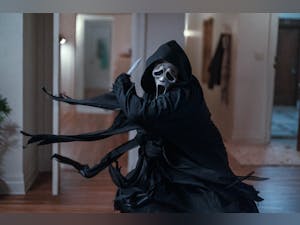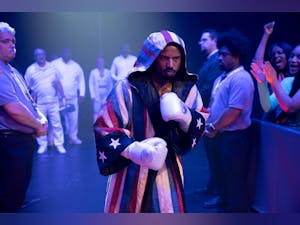From: Silver Screen
Gary Oldman delivers an Oscar-worthy performance in an otherwise unremarkable ‘Darkest Hour’

The latest shows and movies coming to a screen near you.
Something anomalous has happened in filmmaking recently: Two World War II films released concurrently by different directors happened to contain eerily similar subject matter, and managed to complement one another. These films were “Dunkirk” (Christopher Nolan) and “Darkest Hour” (Joe Wright). “Dunkirk” is a harrowing film chronicling the escape of the surrounded British armed forces from the clutches of the Nazis while “Darkest Hour” serves as a biopic of the man who delivered them from their fates.
“Darkest Hour” successfully depicts the engaging British Prime Minister Winston Churchill. However, the Churchill biopic drags along at the pace of Parliamentary proceedings, providing sparse moments of payoff.
The film begins with footage of Nazi soldiers marching and preparing for war with title cards explaining the background for the film: Most of Europe has fallen to German forces, and they continue to advance into France and threaten the security of Britain. Similar information was given at the beginning of ‘Dunkirk,” which serves as a perfect complement to “Darkest Hour.”
Akin to Steven Spielberg's “Lincoln,” the film focuses on a brief period in Churchill’s administration between the time he was elected as Prime Minister and his legendary “We shall fight on the beaches” speech. The film mirrors “Lincoln” in more ways than one, from the scenes in the House of Commons to his contentious relationship with his family; however it is unfair to compare the two movies beyond that, as they fundamentally deal with different subject matters and time periods.
Gary Oldman’s Churchill is mesmerizing, albeit difficult to understand, staying true to form when Elizabeth Layton (Lily James) is warned that he mumbles and speaks sporadically just before being introduced to him. Watching an interview of Oldman before seeing this film will give the viewer an appreciation of the transformation that has taken place on screen. He is almost unrecognizable, both visually and audibly, and the makeup department will certainly secure an Oscar nomination for their work.
However, the film falls just short of being excellent. There is a large cast, all of which get limited screen time and half-realized character arcs. Layton, Churchill's speechwriter and typist, is an endearing character that is robbed of any sort of depth. The same could be said about Churchill’s wife Clementine (Kristin Scott Thomas), who is in a total of about four brief scenes. The inclusion of a familial struggle felt almost like a requirement that the filmmakers had to check off in a long list of chores. It feels like a trope in biopics at this point.
The presence of the previous Prime Minister Neville Chamberlain (Ronald Pickup) and his original choice for his successor Viscount Halifax (Stephen Dillane) serve only as a vehicle to progress an uninteresting subplot where the two try to force peace talks between England and Germany while trying to secure a vote of no confidence in the House that would force Churchill to resign.
King George VI (Ben Mendelsohn) -- who was also underserved with screen time -- lacks depth as well, but delivers one of the more delightful subplots within the film. The King and Churchill have a contentious relationship throughout, which delivers great comedic value. Churchill's first meeting with the King as Prime Minister was at Buckingham Palace, where the two stood opposite ends of the King’s massive office.
Churchill’s relationship to the King was one of the few moments in the film where the comedy didn’t feel completely deliberate and heavy handed, however. There is literally even an unironic butt joke at one point.
All of this serves as an impediment to what could have been one of the best films of the year. The underdeveloped characters could normally be forgiven as pieces of a story about a single person, which of course is the goal of a biographical movie by definition. However, some characters were so irrelevant to the story that they could have gone without mention at all.
Despite being a part of a film with an unclear direction, Oldman delivers a singular performance as Churchill. “Darkest Hour” is worth seeing for his performance alone, and the film will certainly see a few nominations at the Academy Awards, as it seemed tailor-made for them -- most of these awards will be technical (makeup, set design,) with the exception of an all-but-guaranteed best actor nomination for Oldman who outshines this otherwise dreary World War II era film.
Grade B-
‘Darkest Hour’ was released in theaters December 8
life@theeagleonline.com




